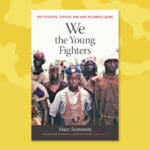A few words from Marc:
 “When I came to Bellagio, I was finalizing the first draft and writing the conclusion and policy recommendations framework. The inspirational setting, supportive collaborative environment, and the wonderful Veduta office helped guide the book.”
“When I came to Bellagio, I was finalizing the first draft and writing the conclusion and policy recommendations framework. The inspirational setting, supportive collaborative environment, and the wonderful Veduta office helped guide the book.”
Quote from We the Young Fighters:
“We the Young Fighters” allows readers to grasp how entrapped young people, in a country weakened by state predation and upended by disturbing, terror-infused warfare, searched for a way to endure and move their lives forward. In Sierra Leone, ostracized youth looked to Rambo’s righteous fight against a perversely structured society and interpreted songs like “Crazy Baldhead” [by Bob Marley] and “All Eyez on Me” [by Tupac Shakur] as siren calls to resist and reinvent themselves. This book ends by extracting lessons learned from Sierra Leone that can be applied elsewhere. All eyes on me indeed.”
Synopsis:
“We the Young Fighters” is at once a history of a nation, the story of a war, and the saga of downtrodden young people and three pop culture superstars. Reggae idol Bob Marley, rap legend Tupac Shakur, and the John Rambo movie character all portrayed an upside-down world, where those in the right are blamed while the powerful attack them. Their collective example found fertile ground in the West African nation of Sierra Leone, where youth were entrapped, inequality was blatant, and dissent was impossible.
When warfare spotlighting diamonds, marijuana, and extreme terror began in 1991, military leaders exploited the trio’s transcendent power over their young fighters and captives. Once the war expired, youth again turned to Marley for inspiration and Tupac for friendship. Thoroughly researched and accessibly written, “We the Young Fighters” probes terror-based warfare and how Tupac, Rambo, and — especially — Bob Marley wove their way into the fabric of alienation, resistance, and hope in Sierra Leone. The tale of pop culture heroes radicalizing warfare and shaping peacetime underscores the need to engage with alienated youth and reform predatory governments. The book ends with a framework for customizing the international response to these twin challenges.

 “When I came to Bellagio, I was finalizing the first draft and writing the conclusion and policy recommendations framework. The inspirational setting, supportive collaborative environment, and the wonderful Veduta office helped guide the book.”
“When I came to Bellagio, I was finalizing the first draft and writing the conclusion and policy recommendations framework. The inspirational setting, supportive collaborative environment, and the wonderful Veduta office helped guide the book.”